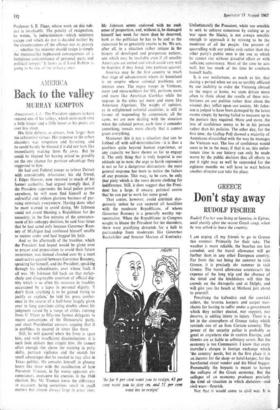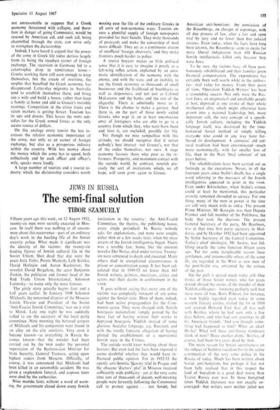Don't stay away
GREECE RUDOLF FISCHER
I am urging all my friends to go to Greece this summer. Primarily for their sake. The weather is more reliable, the beaches are less crowded, and the travel allowance will go further than in any other European country. Far from this not being the summer to visit Greece, it is precisely the summer to visit Greece. The travel allowance counteracts the expense of the long, trip and the absence of the timid and the hitchhikers will thin the crowds on the Akropolis and at Delphi, and will give you the beach at Methoni just about to yourself. Rudolf Fischer was living at lannina, in Epirus, until shortly after the recent Greek coup, when he was asked to leave the country.
Penalising the kafendzis and the souvlaki sellers, the taverna keepers and carpet mer- chants for having to suffer under a government which they neither elected, nor support, nor deserve, is adding injury to injury. There is a lot in the atmosphere of Greece today which reminds one of an Iron Curtain country. The power of the security police is probably as great as anywhere else in eastern Europe, and Greeks are as liable to arbitrary arrest. But the economy is not Communist. I know that every traveller's cheque is foreign exchange which 'the country' needs, but in the first place it is an income for the shop- or hotel-keeper, for the barefooted street vendor and the blind beggar. Presumably the boycott is meant to hasten the collapse of the Greek economy. But the collapse of an economy produces precisely the kind of situation in which dictators—and civil wars—flourish.
Not that it would come to civil war. It is not unreasonable to suppose that a Greek economy threatened with collapse, and there- fore in danger of going Communist, would be rescued by American aid, and such aid, being channelled through the state, can serve only to strengthen the dictatorship.
Indeed, I have heard it argued that the power of the army in Greek life today derives largely from its being the steadiest earner of foreign exchange. The recession in Germany led to a catastrophic drop in remittances home— Greeks working there still earn enough to keep themselves, but the cream of overtime, the surplus that benefited the Greek economy, has disappeared. Latter-day migrants to Australia tend to establish themselves there, and bring out a wife and build a house, rather than keep a family at home and add to Greece's invisible earnings. Competition in the citrus fruits and raisin markets is getting fiercer. Tourism has its ups and downs. This leaves the NATO sub- sidies for the Greek armed forces as the only secure source of dollars.
On this analogy every tourist the less in- creases the relative economic importance of the army, not only as an earner of foreign exchange, but also as a prosperous industry within the country. With less money about the money which the army has to spend, both collectively and by each officer and officer's wife, speaks more loudly.
A large number of tourists and a tourist in- dustry which the dictatorship considers worth wooing ease the life of the ordinary Greeks in all sorts of non-economic ways. Tourists en- sure a plentiful supply of foreign newspapers provided for their benefit. They write thousands of postcards and make the censorship of mail more difficult. They act as a continuous stream of unofficial `foreign observers,' and they make frontiers much harder to police.
A tourist boycott makes so little political sense that it is easy to imagine it purely as a left-wing reflex action, explained by an auto- matic identification of the economy with the enemy, and with the state, and an inability to see the Greek economy as thousands of small businesses and the livelihood of bootblacks as well as shipowners, and not just as Colonel Makarezos and the banks and the rest of the oligarchy. There is admittedly more to it. There is the chance to make a gesture. And there is, on the part of those newly exiled Greeks who urge it, an at least unconscious envy of foreigners who are able to go to a country from which they, who were born there and love it, are excluded, possibly for life.
Yet though we may sympathise with this attitude, we should recognise that it serves nobody's best interest—not Greece's, nor that of the exiles themselves, nor ours. A siege economy favours those who pose as the re- formers. Prosperity, and maximum contact with the outside world, by contrast, nourish pre- cisely the sort of institutions which, we all hope, will soon grow again in Greece.































 Previous page
Previous page